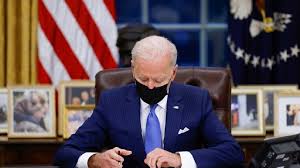President Joe Biden plans to request $715 billion for his first Pentagon budget, quickly generating a vigorous debate in Congress over how much to spend on defense and how to spend it.
The $715 billion for the Defense Department is 1.6% higher than the $704 billion enacted for this year, but it would amount to a decrease of about 0.4% in real terms adjusted for inflation. The proposal, announced Friday as part of the president’s broader budget plan for the next fiscal year, signals efforts to deter China and Russia by advancing hypersonic weapons and bolstering the U.S. Navy fleet with ballistic missile submarines and unmanned ships.
The Pentagon’s budget proposal makes up the largest share of the $753 billion the White House envisions for national security programs. That includes defense-related funding to the Department of Energy, which maintains the nation’s nuclear weapons. The proposal represents an increase of about 1.7% from this year’s $741 billion in such national security funding.
Republican senators who play prominent roles on defense, led by Minority Leader Mitch McConnell, condemned the planned Defense Department spending as an effective cut because it fails to keep up with inflation.
“President Biden’s budget proposal cuts defense spending, sending a terrible signal not only to our adversaries in Beijing and Moscow, but also to our allies and partners,” McConnell said in a statement also signed by James Inhofe, Marco Rubio, Lindsey Graham and Richard Shelby. “Cutting America’s defense budget completely undermines Washington Democrats’ tough talk on China and calls into question the administration’s willingness to confront the Chinese Communist Party.”
Biden’s proposal also exposed rifts over adequate national security spending within the Democratic Party. Liberals such as Representative Ro Khanna of California, a member of the House Armed Services Committee, and Representative Mark Pocan of Wisconsin portrayed the defense proposal as excessive.
“We cannot best build back better if the Pentagon’s budget is larger than it was under Donald Trump,” Pocan said in a statement. “We recognize that non-defense spending has a proposed 16% increase, versus the 1.7% increase in defense spending. But increased spending on the Pentagon on fraud, waste, and zero accountability is still just that, and takes away from funding that could be spent on other people-centric policies like health care, education and housing.”
By contrast, Democratic Representative Betty McCollum of Minnesota, the new chair of the House defense spending panel, praised the proposal as an investment in “essential national security needs.”
“The proposed 1.5% increase for the Department of Defense will sustain readiness and modernization while we also focus on divesting from ineffective legacy programs and eliminating wasteful spending,” she said in a statement.
Source : Bloomberg







